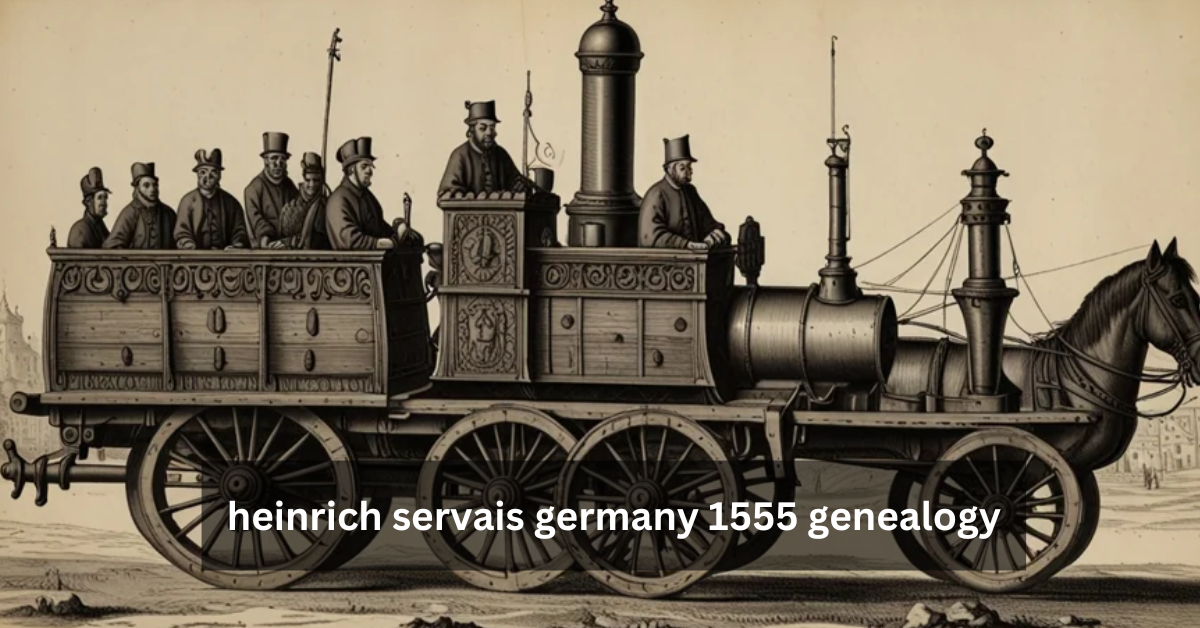Local archives, civil registers, tax lists, land records, and legal documents are key resources for tracing family history during the Reformation era. While church records were disrupted, secular records have survived in many regionsOne such individual whose lineage is of interest is Heinrich Servais, a figure who lived during one of the most tumultuous periods in Germany’s history. The 16th century, especially the years around 1555, were marked by the Protestant Reformation, political upheaval, and significant changes in the way families preserved their histories.
In this article, we will explore the significance of Heinrich Servais within the context of German genealogy, focusing on the challenges faced during the Protestant Reformation. We will look at how the religious conflict of the time affected the preservation of family records and how researchers can navigate the gaps in historical documentation when tracing family histories.
Historical Context of 16th-Century Germany
The Political and Religious Upheaval of the Holy Roman Empire
During the 16th century, Germany was part of the Holy Roman Empire, a vast political entity comprising numerous duchies, principalities, and free cities. The empire’s structure was decentralized, with local rulers exerting significant influence over their regions. This division created a complex tapestry of governance, which was further complicated by the religious strife caused by the Protestant Reformation.
The religious conflict between Catholic and Protestant factions within the empire resulted in widespread social and political upheaval. This period of unrest often disrupted traditional means of record-keeping, making it difficult for genealogists to trace family histories accurately. In particular, local clerical and governmental institutions responsible for maintaining family records were often overwhelmed or destroyed during the turmoil of the Reformation.
The Protestant Reformation and Its Influence on German Society
The Protestant Reformation, spearheaded by figures such as Martin Luther, began in 1517, just a few decades before Heinrich Servais’s time. The Reformation led to a split in Christianity, with Luther and others challenging the authority of the Catholic Church. This religious movement brought about significant changes in German society, not just in terms of theology, but also in how people viewed authority, governance, and family history.
For families like heinrich servais germany 1555 genealogy, this period was marked by a challenge to traditional religious structures that had long maintained records of baptisms, marriages, and deaths. Protestant reformers argued for a more personal and direct relationship with God, often rejecting the clerical hierarchy that had overseen much of the genealogical documentation. This led to the destruction of many records, leaving gaps in family histories that are still felt today.
The Role of Local Governance and Its Impact on Record-Keeping
The decentralization of the Holy Roman Empire also played a crucial role in the preservation of genealogical records. In a system where local rulers were responsible for managing their territories, records were often kept at the local level, in parish books or regional archives. However, with the chaos brought on by the Reformation and the Catholic-Protestant conflicts, many of these records were lost or destroyed.
Moreover, local governance often struggled to maintain consistent documentation, particularly in areas with frequent shifts in political power. This lack of centralized control made it even more challenging to trace family histories, especially for individuals like Heinrich Servais, who were not part of the nobility with more resources and better-recorded lineages.
Heinrich Servais: Who Was He?
A Closer Look at heinrich servais germany 1555 genealogy Life
Heinrich Servais was born around the middle of the 16th century, during a time of great change in Germany. While much of his personal history remains obscured due to the gaps in genealogical records, we can infer that he lived through one of the most turbulent periods in German history. The Protestant Reformation, wars of religion, and shifting political allegiances defined his lifetime.
Servais, like many others, likely experienced the effects of these social and religious upheavals on a personal level. He would have witnessed the conflict between Catholic and Protestant forces, as well as the impact of these religious divides on the local communities in which he lived. This context is essential for understanding the challenges he may have faced in maintaining a family lineage that could be traced through official records.
Overview of His Social Class and Potential Status Within the Community
While much of the detailed genealogy of Heinrich Servais remains unknown, it is likely that he belonged to a lower social class. Families from the nobility had more access to record-keeping resources, and their genealogies were often better preserved due to their wealth and importance. However, commoners like Servais did not enjoy the same privileges, which made it more difficult for future generations to trace their ancestry.
The absence of comprehensive records for commoners, compounded by the destruction of many official documents during the Reformation, means that the genealogy of Heinrich Servais’s family remains a puzzle. This gap in the family’s historical documentation reflects broader challenges faced by researchers of 16th-century German genealogy.
Key Events During Heinrich’s Lifetime That Shaped His Experiences
The political and religious landscape during Heinrich Servais’s lifetime was undoubtedly shaped by significant events, including the continued spread of Protestantism and the tensions surrounding the Catholic Church. The Peace of Augsburg, signed in 1555, allowed for the legal coexistence of Catholicism and Lutheranism within the Holy Roman Empire, marking a pivotal moment in the history of religious tolerance.
Heinrich would have lived through these shifts, and his family’s experiences may have been shaped by the broader societal changes occurring around them. The struggle between Catholic and Protestant factions likely impacted his personal and family history, further complicating any genealogical research.
The Protestant Reformation: Impact on Family Records
How the Reformation Led to the Destruction and Loss of Family Records
The Protestant Reformation significantly impacted the preservation of family records across Germany. As Protestantism spread, many traditional Catholic institutions responsible for maintaining vital records were undermined or destroyed. Churches, monasteries, and other clerical bodies often housed the records of baptisms, marriages, and deaths, and with their disruption came the loss of invaluable genealogical data.
In addition to the physical destruction of records, religious upheaval also led to a shift in how families viewed their own histories. For Protestant families, the focus was often on personal faith and scripture, rather than maintaining genealogical continuity through the church. This cultural shift contributed to the loss of familial records, leaving future generations with fewer tools to trace their ancestral lines.
The Role of Religious Conflict in Limiting the Preservation of Personal Histories
The religious conflict between Catholics and Protestants during the Reformation made it particularly difficult for families like the Servais family to preserve their histories. In areas where one faction held political and religious power, records were often altered or destroyed to erase the presence of opposing groups. This further complicated the genealogical research of individuals whose family histories may have been tied to communities caught in the crossfire.
Genealogical research during this period became increasingly difficult due to the social and religious conflict that raged across the Holy Roman Empire. Churches and clerical institutions were not just places of worship—they were vital centers for maintaining family histories. The disruption of these institutions left behind fragmented and incomplete records, adding complexity to the task of researching family histories from this era.
Challenges Faced by Genealogists When Researching Family History in Reformation-Era Germany
Genealogists who attempt to trace family histories in 16th-century Germany face several obstacles. The destruction of records, the loss of parish books, and the fragmentary nature of surviving documents all contribute to the challenge. Moreover, the Protestant Reformation introduced a new layer of complexity, as many Protestant communities did not maintain the same level of genealogical documentation as their Catholic counterparts.
Researchers are often forced to rely on alternative sources, such as land records, wills, and legal documents, to piece together family histories. These records, however, are often incomplete and may only offer glimpses into a family’s past, rather than the detailed lineage provided by parish records.
Genealogical Records and Their Preservation in 16th-Century Germany
The State of Record-Keeping Before and After the Reformation
Before the Protestant Reformation, the Catholic Church played a central role in maintaining genealogical records. These records were generally kept in parish registers, which documented births, marriages, and deaths. For families of nobility or those in towns, these records were well-preserved, but for the common population, record-keeping was less reliable.
The Reformation disrupted this system, with Protestant communities often creating their own records, or in some cases, abandoning genealogical documentation altogether. In regions where Catholics and Protestants lived side by side, there were often conflicting systems of record-keeping, further complicating genealogical research for future generations.
Local vs. Noble Family Records: The Divide in Genealogical Documentation
Noble families had better access to the resources needed to maintain their genealogical records. This made it easier for researchers to trace noble lineages, as these families often had well-maintained family trees, property records, and court documents. In contrast, commoners like Heinrich Servais had fewer resources for documenting their family history, making it harder to uncover details of their ancestry.
Noble families also had the advantage of being able to preserve their histories through land ownership and other legal means, which were recorded in property documents. These types of records were often not available to commoners, further complicating genealogical research for families like the Servais family.
The Evolution of Genealogy in Post-Reformation Germany
After the chaos of the Reformation, the landscape of genealogy in Germany changed considerably. The destruction of records, combined with the rise of Protestantism, altered how family histories were documented and passed down. For families like Heinrich Servais’s, whose genealogical trail was obscured by these historical shifts, the lack of proper documentation poses a significant challenge to modern researchers.
However, the 16th century also saw the emergence of new methods for keeping track of family lines. Some Protestant communities adopted new forms of record-keeping, including civil registers. These registers, often maintained by local governments, were intended to replace the church-based records that had been disrupted. Though not as widespread or reliable as earlier church records, these civil registers provided a more secular approach to tracking family events, such as births, marriages, and deaths.
The Influence of Local and Regional Archives
Given the fragmented nature of record-keeping during and after the Reformation, researchers focusing on families like the Servais family must often turn to local archives. These archives might contain records that were not destroyed during the religious conflicts or documents maintained by local civic authorities who were not directly involved in the religious turmoil.
The regional archives in places like Württemberg, Saxony, or Bavaria—regions with a strong Lutheran or Catholic presence—can sometimes yield partial genealogies that reflect the conditions of the time. The preservation of certain civil records, such as tax lists or land ownership documents, has allowed genealogists to piece together some aspects of family histories from this period.
Genealogical Research in the Context of Heinrich Servais
Despite the challenges of finding genealogical information about Heinrich Servais, it is still possible for researchers to uncover aspects of his life. By focusing on the few available records from his locality—whether civil, legal, or land-related—genealogists may be able to assemble a partial family tree.
For Heinrich Servais’s descendants or others with an interest in his genealogy, it is important to engage with the broader historical context and utilize alternative records. For example, historical maps, tax documents, legal petitions, and property transactions can offer important insights into the family’s position within society, their movements, and their relationships with others in the region.
Moreover, many German regions have embraced modern genealogical tools and databases that can assist in tracing familial ties. Although these resources may not fill in every detail of Heinrich Servais’s life, they can help provide a clearer picture of the broader historical environment in which he lived.
Conclusion
Tracing the genealogy of heinrich servais germany 1555 genealogy, like many individuals from the 16th century, presents unique challenges due to the complex political, religious, and social landscape of the time. The Protestant Reformation, combined with the decentralization of the Holy Roman Empire, contributed to the disruption of traditional record-keeping systems, particularly for common people. However, by utilizing alternative historical records and regional archives, researchers can still make significant strides in reconstructing family histories from this period.
Genealogists today are tasked with piecing together fragmented historical records and navigating the gaps caused by the destruction of vital records during the Reformation. Although the journey to uncover the full genealogy of Heinrich Servais may not be straightforward, it serves as a reminder of the resilience of family history and the importance of understanding the historical forces that shape it.
Frequently Asked Questions
Why were family records lost during the Reformation?
The Protestant Reformation led to significant religious and political upheaval, causing many church records to be destroyed or lost, especially in areas caught between Catholic and Protestant forces.
How can I find information on common families from 16th-century Germany?
Common families from this time often left fewer traces, but researchers can still rely on local government records, regional archives, and land documents to uncover information.
Was Heinrich Servais a noble or commoner?
While Heinrich’s social status is unclear, it is likely that he was a commoner, as noble families had better access to genealogical documentation and resources.
What is the best way to research genealogy from the 16th century?
The best approach combines historical context, local archives, and a broad range of resources, such as legal documents, tax records, and surviving church records, to piece together family histories.
Stay in touch to get more updates & alerts on Picnob! Thank you



